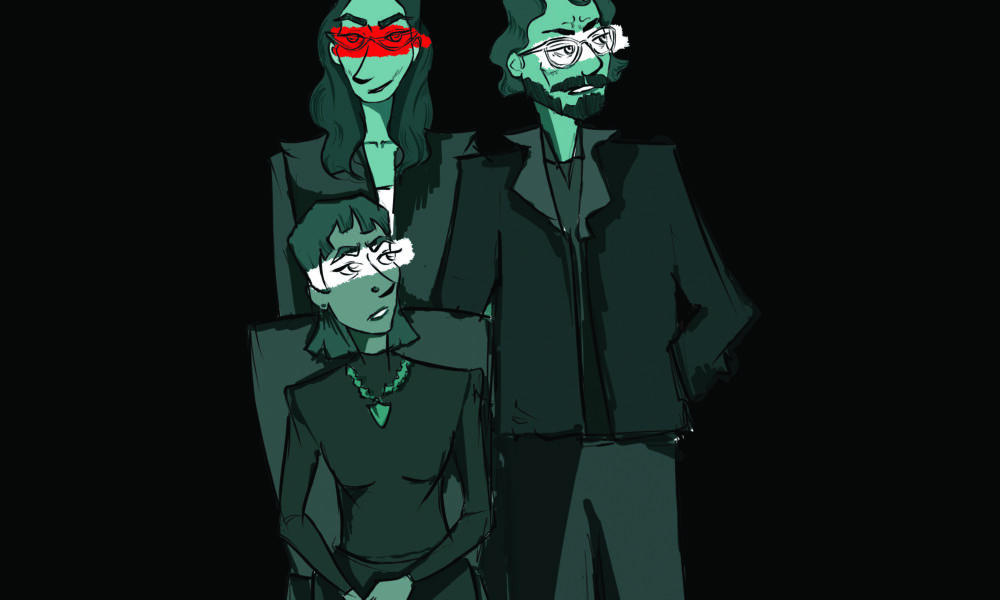With a laughably talented cast and a whopping $75-million budget, Netflix’s original film Don’t Look Up generates lofty expectations that it ultimately fails to meet. The film follows astronomers Kate Dibiasky (Jennifer Lawrence) and Dr. Mindy (Leonardo DiCaprio)’s attempt to warn the U.S. government and general public about a comet large enough to cause mass extinction barrelling toward earth. By extension, it aims to provide social commentary on how a global population responds to, or simply ignores, crises such as the COVID-19 pandemic and climate change. Over the course of the film, the protagonists’ concern for the future of the human species meets humorously grudging resistance from characters that walk a precarious line of clichés. Don’t Look Up emphasizes the danger of apathy, and media-fuelled politics’ twisting of facts—even as morbid as imminent extinction—into headlines palatable for public consumption. The forced humour and supersaturated clichés detract from the film’s political punch, and bury the moral of the story.
Directed and produced by Adam McKay, the film’s impressive cast and contemporary relevance have attracted much buzz. Regardless of which celebrity’s appearance they anticipated, viewers flocked to Netflix’s streaming platform, amassing over 111 million hours of watch-time in the film’s first two days of release. From a laissez-faire U.S. president (Meryl Streep), to incessantly positive news hosts (Cate Blanchett and Tyler Perry), to a socially anxious billionaire (Mark Rylance), the characters are distinct in their portrayal, yet trite in their stock.
The film’s characters border on the annoying and one-dimensional. Scattered cameos of other actors—such as Ariana Grande’s musical appearance—provide little purpose other than shock value and name recognition. Numerous political allusions are made, though the most obvious is that of the U.S. president and her chief of staff, who bear semblance to the Trump family. Although Streep’s performance as the U.S. President is comedic, it is cartoony—and her son (Jonah Hill) simply fulfills the stereotype of the bland, spoiled rich kid. However, Timothée Chalamet provides genuine comic relief, and rumours that he improvised much of his role are believable. The two protagonists, Kate and Dr. Mindy, manage to narrowly subvert stereotypes: Their frustration evokes sympathy, and their flaws and character development feel authentic.
Still, after two agonizingly slow hours of brain-numbing dialogue, perhaps the most redeemable scene is the last one. It is a well executed balance of calmness and dread, aptly conveying the Everything-Is-Totally-Fine mindset with a biblical nod to the Last Supper. In the simplicity of the dinner party, an almost uncomfortable feeling of acceptance radiates out, allowing for a perfectly melancholy ending. As the rest of the film leaned heavily into satire, here it feels like it’s finally giving up, just like its characters. It is the one scene where jokes are not unnaturally forced into the script and viewers are not spoon-fed political allusions. It stands out as a different caliber of cinematography than the rest of the film.
Ironically, the film itself experiences the same struggles as its protagonists, as its own execution distracts from the main message: We are all going to die if we don’t do something soon. Don’t Look Up was advertised as a political comedy, and though jokes are littered throughout the script, it simply is not very funny. Whether intentional or not, the failed humour of the film acts as a thinly veiled coping mechanism for the societal collapse it alludes to. But as jarring as Kate’s profane explosion on live television was, it seems that seeing Timothée Chalamet sport a mullet or one too many of Jonah Hill’s cringe-worthy remarks is enough to steal the media spotlight. So, like the Dibiasky comet, it seems the moral of this film has gone right over most people’s heads.









